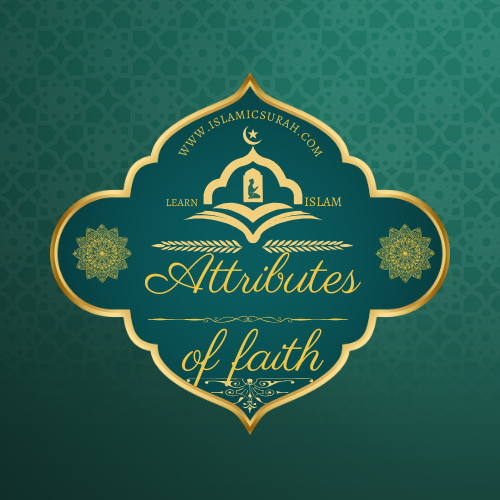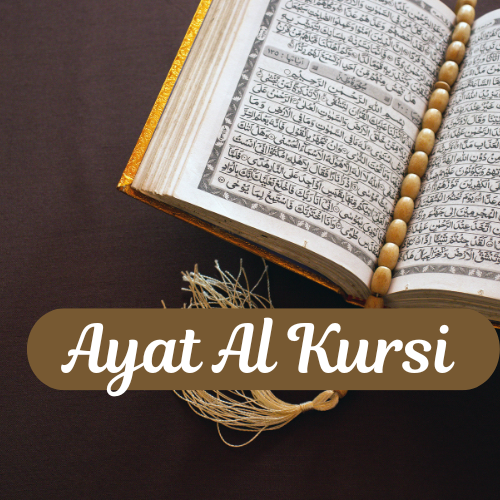Read about ashra dua in ramadan and suhoor and iftar dua
The word Ramadan, derived from Arabic roots that signify “thirst” and “sun-baked ground,” encapsulates the essence of a sacred month deeply woven into the fabric of Islamic traditions. During this auspicious period, Muslims around the world embark on a spiritual journey marked by fasting, prayer, and reflection. As the ninth month of the Islamic calendar unfolds, believers willingly embrace a profound experience of self-discipline and devotion. The daily fast, observed from dawn to sunset, extends beyond abstaining from food and drink; it becomes a symbolic act of empathy, instilling a heightened awareness of the hunger and thirst faced by those less fortunate. As Muslims worldwide unite in this shared commitment, Ramadan serves as a profound reminder of the values of compassion, gratitude, and the pursuit of spiritual.
When is Ramadan 2024 (Ramadan in 2024)
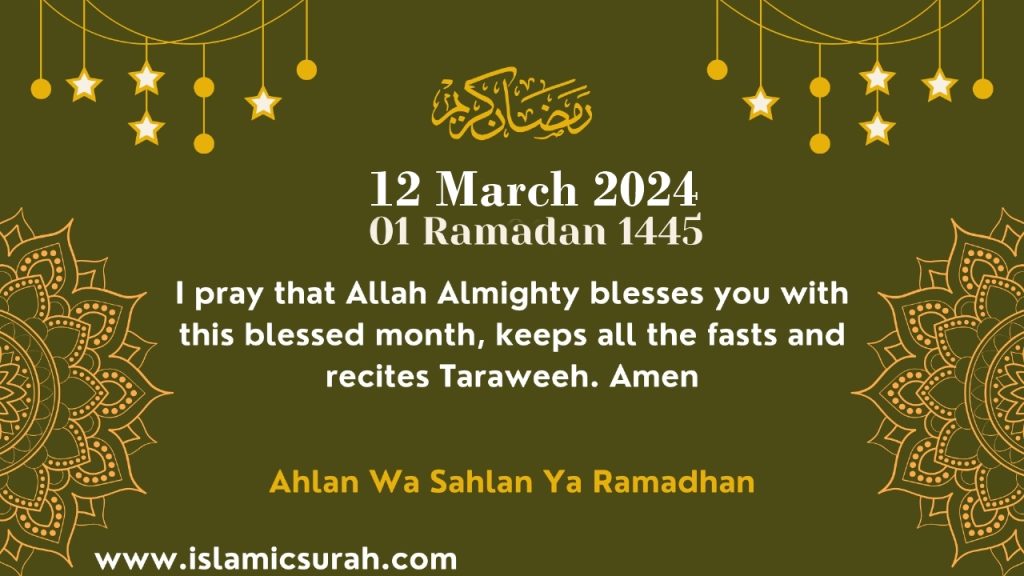
As the Islamic calendar follows the lunar cycle, the month of Ramadan Mubarak rotates by approximately ten days each year, depending on the sighting of the moon. In 2024, it is expected that Ramadan will commence on the evening of Monday, March 11th, with the first day of fasting observed on Tuesday, March 12th. This sacred month holds great significance for Muslims worldwide, marking a period of fasting, prayer, reflection, and spiritual growth. As the crescent moon ushers in the beginning of Ramadan, individuals and communities come together to embrace the virtues of self-discipline and deepen their connection with Allah.
2024 Ramadan trend
The 2024 Ramadan trend underscores the ability of technology to enhance and amplify the spiritual journey, bringing communities together in innovative ways during this sacred month. Apart from this, in Ramadan 2024, a prominent trend that has gained momentum is to pray for Palestine and people of Palestine.
Please remember Palestine in your prayers during this Ramadan.
We know Allah likes it when we ask Him, and He’s promised to respond fast. This Ramadan, as we worship more and give generously, let’s remember to pray for Palestine. Praying during the last part of the night, when traveling, or before iftar are moments when Allah is close and ready to answer. So, let’s not hesitate! Let’s raise our hands and pray for Palestine!
Fasting in Ramdan
“O you who have believed, decreed upon you is fasting, as it was decreed upon those before you, that you may become righteous.” [Quran 2:183]
People see fasting in Ramadan as self-purification, spiritual growth. This is the time when Muslims strengthen their relationship with Allah. They ask for forgiveness, adopt the attributes of compassion and self-control. Fasting during Ramadan isn’t just a physical act; it’s like making an investment in our afterlife. When we fast with sincere intentions, there are significant rewards. In the afterlife, there are eight gates to paradise, and one of them is called Ar-Rayyan. Only those who fasted for the sake of Allah in this life will be allowed through this gate. It’s a way of earning something precious in the hereafter through our dedication to fasting. Two essential meals, Sehri (suhoor) and iftar, characterize this month.
Suhoor
Sehri, also known as suhoor, constitutes an important meal in the month of Ramadan. It is considered as a spiritual and religious practice. Those who fast for the whole day before dawn eat this food. It marks the beginning of a day dedicated to reflection, compassion, and community. Which is uniting millions of Muslims worldwide.
Dua for fasting or sehri dua
”وَبِصَوْمِ غَدٍ نَّوَيْتُ مِنْ شَهْرِ رَمَضَانَ’‘
translated as follows, “I intend to fast tomorrow in the month of Ramadan.”
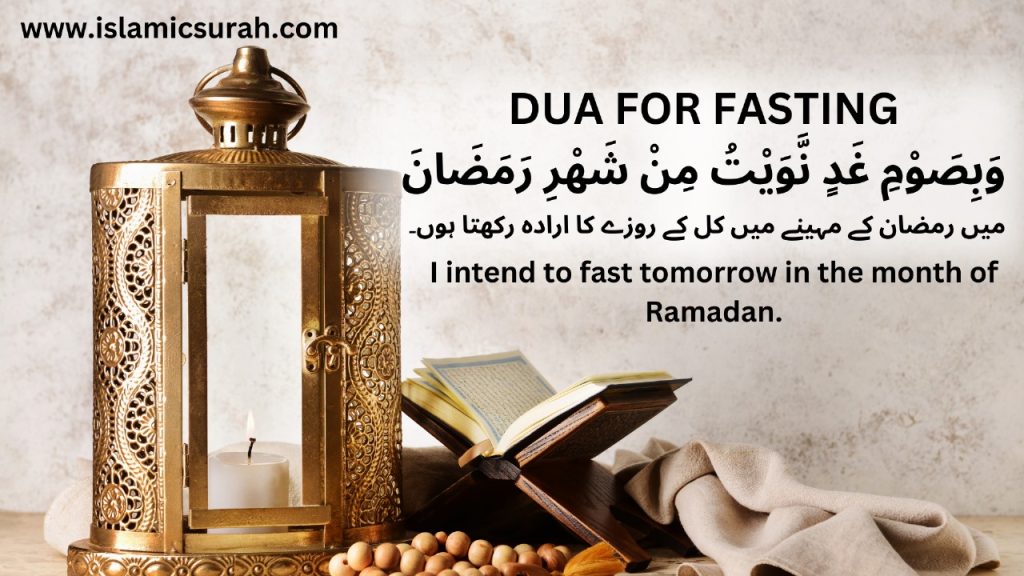
Iftar
Iftar, evening meal starts after the sunset prayer, (Maghrib) during Ramazan. Muslims break their fast with dates and water, following Prophet Muhammad’s tradition. Dates are nutritious, gentle on the stomach and provide instant energy after fasting. Iftar is an important time to unite families, share food and express gratitude.
Dua for iftar
“اللّٰهُمَ اِنِّي لَكَ صُمْتُ وَبِكَ آمَنْتُ وَعَلَيْكَ تَوَكَّلْتُ وَعَلَى رِزْقِكَ اَفْطَرْتُ”
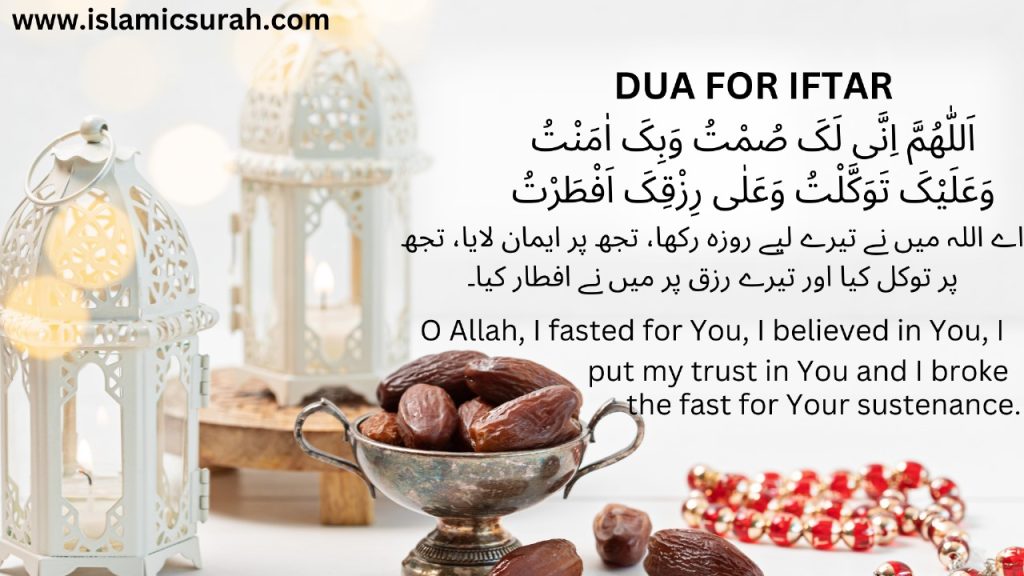
3 Ashra of Ramadan (3 stages of ramzan )
Three parts commonly called three Ashra of Ramadan divide the holy month of Ramadan. Each Ashra has its own merit and significance in this Holy month, serve as stage within the month, guiding Muslims through dedicated periods of reflection, repentance, and heightened devotion
First Ashra of Ramadan
The first ashra is the first ten days of ramazan. Muslims ask Allah for mercy in these 10 days and give full attention to attaining the mercy of Allah.As Ramadan progresses, each subsequent ashra comes up with a different theme that guides Muslims on a spiritual journey of transformation throughout the month.
First ashra dua
Dua for first ashra is given as,
“رَبِّ اغْفِرْ وَارْحَمْ وَأَنْتَ خَيْرُ الرَّاحِمِينَ”
Translated as. “My Lord, forgive me and have mercy, and you are the best, most merciful”
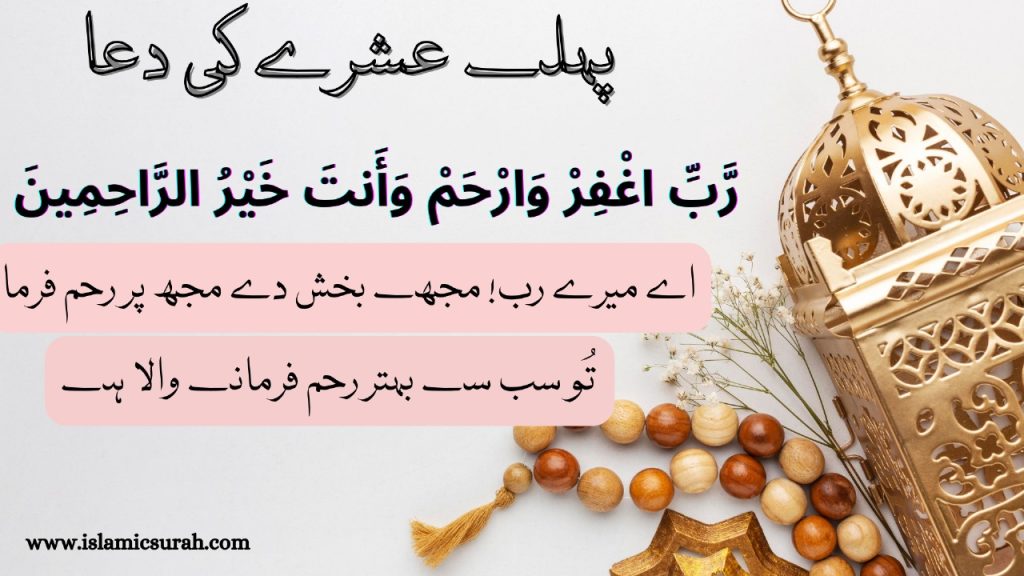
2nd Ashra of Ramdan
Second ten days of Ramadan day 11th to day 20th consists of the Ashra of forgiveness. Muslims must seek the forgiveness of Allah Almighty and regret for all their mistakes.
2nd ashra dua
Dua for second ashra is;
أسْتَغْفِرُ اللهَ رَبي مِنْ كُلِ ذَنبٍ وَأتُوبُ إلَيهِ
Translated as. “I ask forgiveness of my sins from Allah who is my Lord and I turn towards Him.”
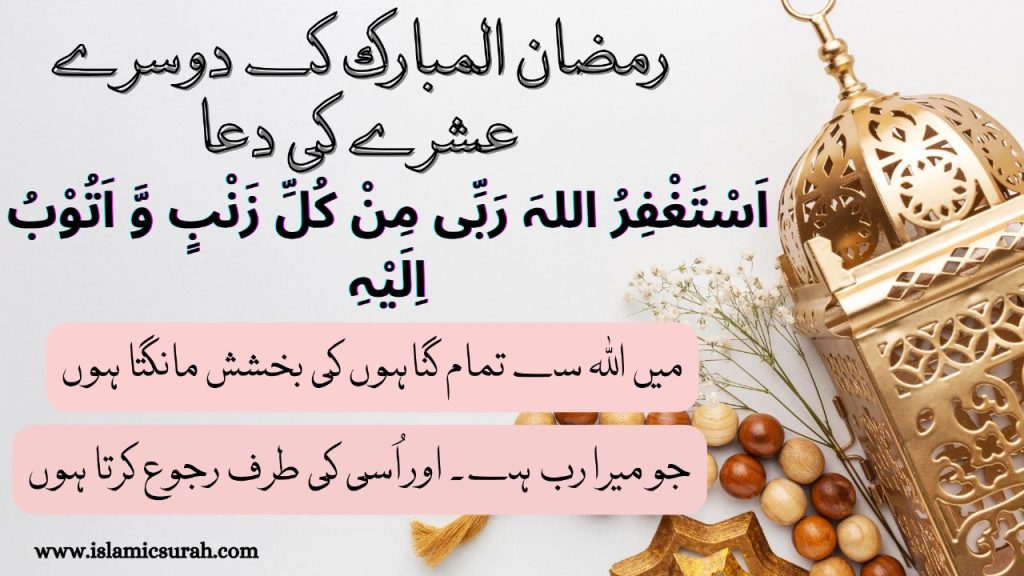
3rd Ashra of Ramzan
3rd Ashra begins on 21st Ramadan and ends on 29th or 30th ramzan depending on the moon. The third ashra delivers believers from hell.
3rd Ashra dua
Dua for third ashra;
اَللَّهُمَّ أَجِرْنِي مِنَ النَّارِ
Translated as; ”O Allah! Save me from the Hellfire”
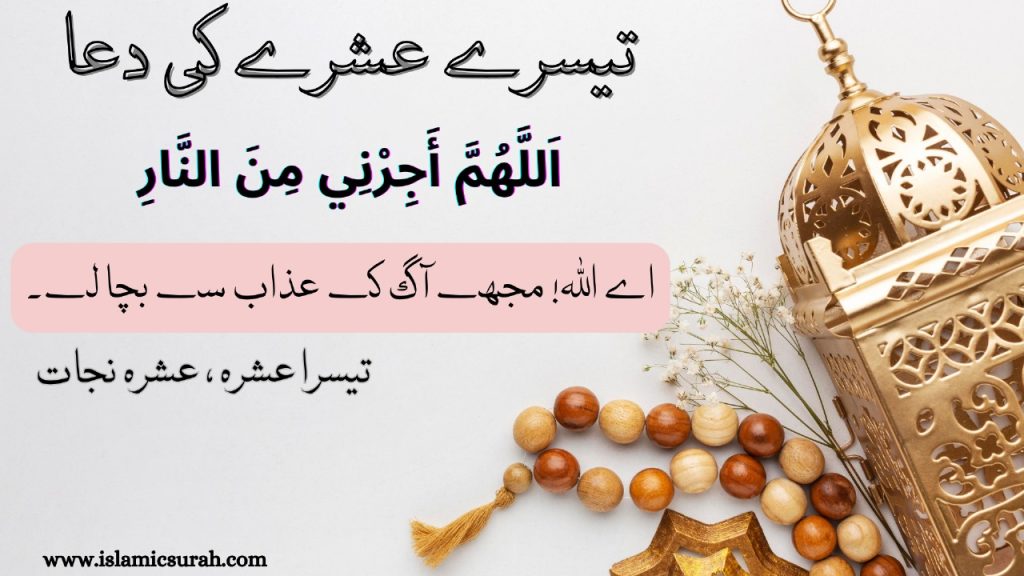
Taraweeh Prayer
Taraweeh in Ramadan
The term “Taraweeh” is derived from the Arabic word meaning “to rest and relax,” invoking to the intervals of rest taken during its performance. Starting from the first night of Ramadan, Taraweeh continues throughout the month, reflecting a collective effort by the Muslim community to engage in lengthy acts of worship, seek spiritual closeness to Allah, and reflect on the divine teachings of the Holy Quran. Click here to read more about Taraweeh.
Significance and Benefits of Fasting
- Increase person’s Taqwa: Fasting during Ramadan increase an individual’s Taqwa, fostering a deeper sense of piety and mindfulness.
- Increased empathy and compassion: The experience of hunger and thirst during fasting indicates the problems of the needy people. As individuals feel the pangs of hunger, there arises a heightened sensitivity to the plight of the less fortunate.
- Spiritual reflection; Fasting significantly amplifies the capacity for spiritual reflection
- Enhanced self-control over desires; Fasting serves as a motivator for the enhancement of self-control over desires. Individuals engage in a purposeful exercise of discipline, abstaining from food ,drink and certain behavior.
- Gratitude and appreciation: As people abstain from food and drinking, they become aware of the blessings they value in life.
“Shab e Qadr: Click Here to Learn About This Precious Moment of Mercy and Blessings”
I'tikaf
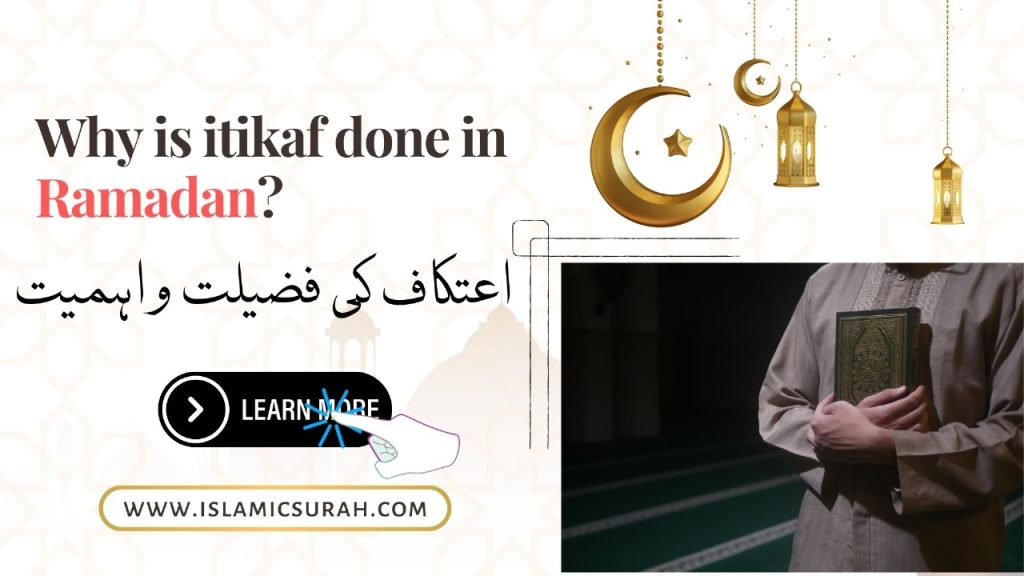
Itikaf is when you spend the last 10 days of Ramadan praying and worshiping only Allah (swt), either in a mosque for men or at home for women.
A Spiritual Retreat in Islamic Tradition"
It’s recommended to do I’tikaf during the last ten days of Ramadan because the Prophet did it during that time. Linguistically, I’tikaf means devotion to something and sticking to it. In Islamic law, it means that a Muslim stays in the mosque to remember God, pray, read the Quran while fasting, and avoids intimate relations and anything that may lead to it for a day or more with a specific intention. This spiritual retreat holds significant importance in Islamic tradition, offering believers a dedicated time for introspection, prayer, and closeness to God. Let’s delve deeper into the essence of I’tikaf and its spiritual significance.
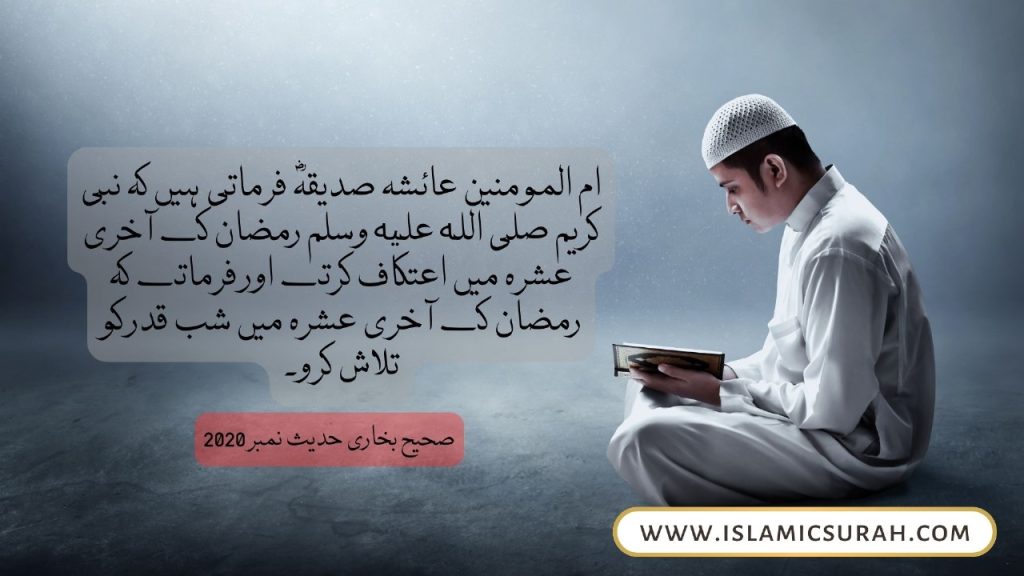
Requirements for Itikaf
There are following requirements for observing Itikaf.
Being a Muslim
The primary requirement for engaging in itikaf is that the individual must adhere to the Muslim faith.
The individual must possess mental clarity.
This implies that an individual must have the capacity to formulate logical and sensible thoughts and choices. To elaborate, a person should not be inebriated or influenced by substances that could impair their cognitive functions.
In a mosque
Surah Al-Baqarah 2:187 specifies that itikaf is to be observed in a mosque. Although there may be some who argue for the permissibility of performing itikaf at home, particularly for women, the consensus among scholars is that this is not valid as it contradicts the Quranic directive.
Fasting
According to the majority of Islamic jurisprudence, fasting is a prerequisite for engaging in itikaf. This practice is mentioned in the Quran alongside the fasting of Ramadan. The Prophet Muhammad (peace be upon him) consistently observed fasting during his itikaf. Nonetheless, there’s a viewpoint permitting participation in itikaf for individuals with medical conditions like diabetes, which prevent them from fasting. It’s essential to distinguish between a medical condition and temporary illnesses such as fever or nausea.
Virtues and benefits of Itikaf
The virtues of itikaf are as follows
- The individual engaged in Itikaf stays devoid of sins, and they receive rewards equivalent to those who perform good deeds, despite not having performed these deeds themselves.
-
Itikaaf facilitates the performance of Salah with complete devotion as the one observing it severs all connections with the external world. In a state of tranquility, devoid of distractions, they solely focus on remembering Allah, allowing their mind to concentrate solely on obeying and pleasing Him.
-
Another advantage of Itikaaf is that the individual observing it has the opportunity to pray in the front row, making it easier for them to fully benefit from offering prayers in this position.
Abu Hurairah narrates that the Messenger of Allah, peace and blessings be upon him, said, “If people knew the reward of giving the call to prayer (Adhan) and standing in the first row (for prayer), they would certainly compete for it.” (Bukhari)
